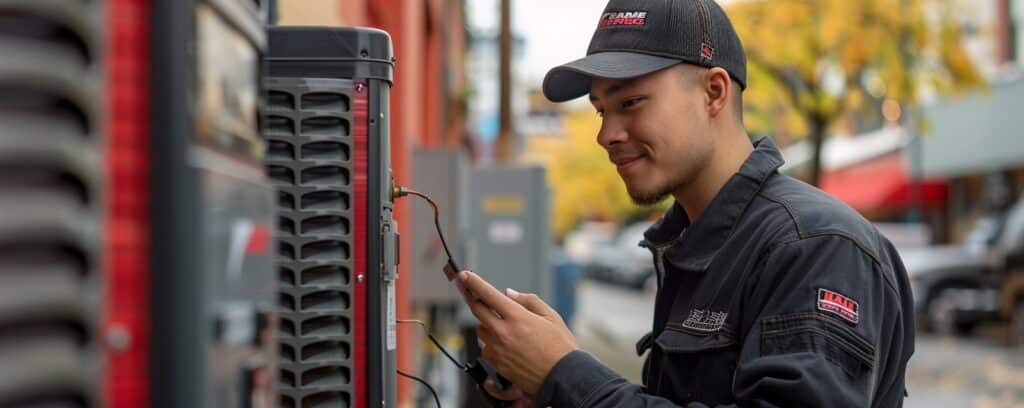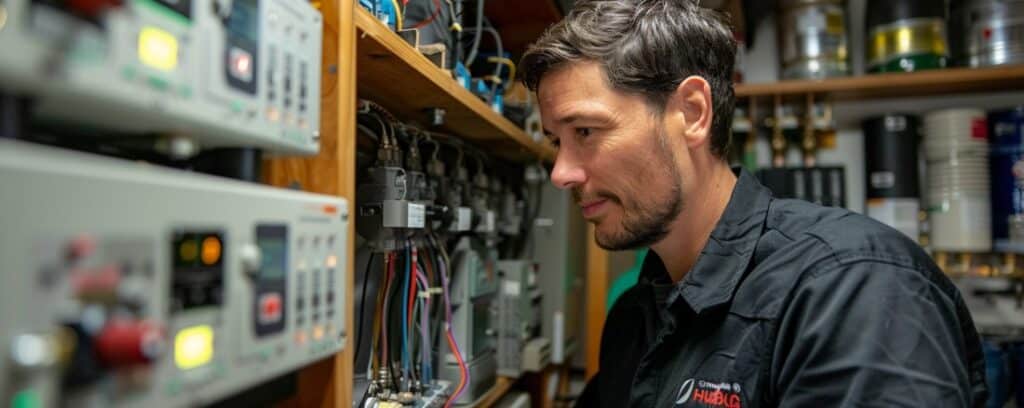Choosing a career path is a significant decision, one that shapes your future and defines your daily life. Among the diverse options available, becoming an air conditioning (AC) technician stands out as a promising and fulfilling choice.
This profession not only offers practical skills but also provides a stable and ever-evolving career landscape.
The demand for skilled AC technicians is on the rise, driven by growing residential and commercial needs for temperature control and energy efficiency.
Individuals who are interested in a technician career should delve into the essential steps to embark on this rewarding career path, including the education, training, and personal attributes needed to succeed as an AC technician.
Understanding the Role of an AC Technician
An AC technician, also known as an HVAC (heating, ventilation, and air conditioning) technician, plays a crucial role in installing, maintaining, and repairing air conditioning systems.
These systems are vital in ensuring comfortable living and working environments in homes, offices, schools, and various other settings. The job of an AC technician is multifaceted, involving technical knowledge, problem-solving skills, and a commitment to safety and efficiency.
AC Technician Key Responsibilities:
- Installation: AC technicians are responsible for installing new air conditioning systems. This process involves assessing the space, preparing installation equipment, and ensuring that the system operates efficiently.
- Maintenance: Regular maintenance is crucial for the longevity of air conditioning systems. Technicians perform routine checks, clean filters, and ensure that all components are functioning correctly.
- Repair: When air conditioning systems malfunction, AC technicians diagnose the problem and execute repairs. This might involve replacing faulty parts, fixing leaks, or recalibrating systems.
- Customer Service: Interacting with clients is a significant part of the job. Technicians must communicate effectively, explaining maintenance procedures, and providing recommendations for system improvements.
AC Technician Skills and Attributes:
- Technical Expertise: Proficiency in understanding complex air conditioning systems is fundamental. Technicians need to keep up-to-date with technological advancements in the field.
- Problem-Solving: The ability to quickly identify and resolve issues is essential. Each repair or installation presents unique challenges that require critical thinking.
- Physical Dexterity: AC technicians often work in tight spaces and handle heavy equipment. Physical fitness and coordination are important.
- Attention to Detail: Ensuring that every component of an AC system is correctly installed and maintained requires meticulous attention to detail.
- Safety Consciousness: Knowledge of and adherence to safety protocols is non-negotiable. Technicians work with electrical systems, refrigerants, and other potentially hazardous materials.
AC technicians work in various settings, from residential homes to large industrial complexes. Their skills are not only in demand during the warmer months but year-round, as many modern AC systems also incorporate heating elements.
The role of an AC technician is both challenging and rewarding, offering a blend of technical, physical, and interpersonal work that appeals to a wide range of individuals.
AC Technician Daily Responsibilities
The role of an AC technician is both challenging and rewarding, blending technical skills with problem-solving and customer service.
Examining the typical daily tasks and the essential skills required to excel in this role offers insight into the life of an AC technician.
Typical Daily Tasks
A typical day for an AC technician is diverse and dynamic, involving a range of activities that require both technical knowledge and practical skills.
- Diagnostic Assessments: The day often begins with diagnostic assessments, where technicians meticulously examine air conditioning systems to identify any issues. This task requires a keen eye for detail and a deep understanding of HVAC systems to accurately diagnose problems.
- Maintenance and Repairs: Routine maintenance and repairs are a significant part of the job. Technicians must ensure that all AC units they manage are in top working condition, which involves cleaning components, replacing filters, and fixing any malfunctioning parts.
- Installation: Installation of new air conditioning systems is another critical task. This involves not just the physical installation but also advising clients on the best systems for their needs and ensuring that installations comply with all relevant regulations and standards.
- Customer Interaction: Interacting with clients is a daily activity, requiring technicians to clearly explain issues, recommend solutions, and provide guidance on maintaining their AC systems. Effective communication and customer service skills are essential to build trust and ensure client satisfaction.
- Safety Compliance: Every task must be performed with strict adherence to safety protocols. AC technicians need to be knowledgeable about industry safety standards and ensure that their work complies with these regulations to prevent accidents and ensure long-term safety and efficiency of the AC systems.
Essential Skills for Success
Success as an AC technician hinges on a blend of technical, analytical, and interpersonal skills.
- Technical Expertise: A thorough understanding of HVAC systems and electrical components is fundamental. Technicians must be able to understand complex systems and troubleshoot issues with confidence.
- Problem-Solving Ability: Quick and effective problem-solving is crucial. Technicians often encounter unexpected issues and must be able to think on their feet to provide timely solutions.
- Attention to Detail: Precision is key in this role. Whether it’s installing new systems or making repairs, every detail must be executed with accuracy to ensure the longevity and efficiency of the AC units.
- Customer Service Skills: Strong communication skills are vital. Technicians must be able to explain technical information in layman’s terms and build rapport with clients to understand their needs and concerns.
- Physical Fitness: The role is physically demanding, often requiring lifting heavy equipment, working in confined spaces, and sometimes working in extreme weather conditions. Physical fitness and stamina are essential to perform these tasks effectively.
Each day in the life of an AC technician brings new challenges and opportunities. From diagnosing and fixing complex issues to ensuring customer satisfaction, the role demands a wide range of skills and a commitment to excellence.
Step-by-Step Guide to Becoming an AC Technician
Embarking on a career as an AC technician involves several critical steps, each designed to build the foundational skills and knowledge necessary for success in this field.
The following steps outline the journey from education to certification, emphasizing the importance of each step in shaping a competent and skilled AC technician.
Educational Requirements
The educational journey for an aspiring AC technician begins with a solid foundation in relevant subjects and progresses through specialized training.
High School Education
- Core Subjects: A high school diploma is typically the first step, with a focus on mathematics and physics, which are crucial for understanding the technical aspects of HVAC systems. Vocational courses in heating, ventilation, and air conditioning provide an initial insight into the field.
Postsecondary Education Options
- Vocational Training: Postsecondary vocational or trade schools offer specialized programs in HVAC technology. These programs typically cover topics like system design, refrigeration fundamentals, and electrical work, equipping students with the practical skills needed for the job. Programs may last six months to a year.
- Community College Courses: Community colleges often provide more comprehensive courses or associate degree programs in HVAC technology. These programs may offer a broader educational experience, including general education courses, in addition to in-depth technical training. Programs typically last about two years.
Gaining Practical Experience
Hands-on experience is crucial in this field, providing real-world exposure to the complexities of HVAC systems.
- Apprenticeships: Many technicians start their careers with apprenticeships, which combine on-the-job training with classroom instruction. Apprentices work under the supervision of experienced professionals, learning the intricacies of the trade over a period of typically three to five years.
- Internships: Internship opportunities, often offered through technical schools or community colleges, provide another avenue for gaining practical experience. Interns may assist with installations, repairs, and maintenance, gaining valuable experience in a real-world setting.
Certification and Licensing
Certification and licensing are critical steps for establishing credibility and meeting industry standards.
- Industry Certifications: Certifications like the EPA Section 608 Technician Certification are essential for any technician who works with refrigerants. These certifications demonstrate a technician’s knowledge and adherence to environmental and safety standards.
- State Licensing: Most states require AC technicians to be licensed. The licensing process varies but generally includes passing an exam and providing proof of experience. Prospective technicians should research the specific requirements in their state.
Building a Professional Network
Establishing connections within the industry can lead to job opportunities and professional growth.
- Industry Associations: Joining professional organizations such as the Air Conditioning Contractors of America (ACCA) offers networking opportunities, access to industry news, and resources for continuous learning.
- Conferences and Workshops: Participating in industry conferences and workshops is an excellent way for technicians to network, learn about the latest technologies, and stay informed about best practices in the field.
Continuing Education and Career Advancement
Continual learning is key to advancing in this rapidly evolving field.
- Specialization Certifications: As technology advances, specializing in areas such as energy efficiency or commercial refrigeration can open up new career opportunities. Pursuing additional certifications can distinguish a technician in these niche areas.
- Ongoing Learning: Staying updated with the latest developments in HVAC technology is crucial. Engaging in workshops, webinars, and continuing education courses helps technicians stay relevant and knowledgeable about industry trends and innovations.
Following these steps provides a structured path for those aspiring to become AC technicians.
From foundational education to continuous professional development, each stage is integral to building a rewarding career in this essential and evolving field.
The Benefits of Being an AC Technician
Choosing a career as an AC technician comes with a host of benefits that make it a fulfilling and viable profession.
The advantages of pursuing this career path that contribute to job satisfaction and long-term career success include the following:
- Job Stability and Demand: The need for qualified AC technicians remains consistently high due to the essential nature of heating and cooling systems in residential and commercial buildings. This demand offers job security and stability.
- Diverse Work Environments: AC technicians have the opportunity to work in various settings, from homes and offices to industrial sites, ensuring a dynamic and changing work environment that keeps the job interesting.
- Opportunity for Advancement: There is significant scope for career advancement in this field. Technicians can move into supervisory roles, start their own business, or specialize in areas like commercial refrigeration or green energy systems.
- Continuous Learning and Growth: The HVAC industry is continually evolving with new technologies and systems. This constant evolution provides opportunities for ongoing learning and professional development.
- Personal Satisfaction: There is a high level of personal satisfaction in this role, as technicians directly contribute to the comfort and safety of individuals and communities. Solving complex problems and seeing the immediate impact of their work can be highly rewarding.
AC Technician Employment Settings
AC technicians can find employment in a variety of settings, each offering unique experiences and challenges.
The most common types of employers and work environments for AC technicians include the following.
- Residential Services: Many technicians work in the residential sector, providing installation, maintenance, and repair services to homeowners. This setting often involves direct interaction with clients and the ability to address a wide range of system types.
- Commercial and Industrial Settings: Technicians in commercial and industrial environments work on larger systems and face different technical challenges. These settings may include office buildings, factories, and large commercial complexes.
- Self-Employment: Some AC technicians choose to start their own business, offering services directly to clients. This path provides autonomy and the chance to build a personal brand in the local market.
- Government and Institutional Settings: Technicians may also find opportunities in government facilities, schools, hospitals, and other institutions that require regular maintenance and servicing of their HVAC systems.
- Geographic Variation in Demand: The demand for AC technicians varies by region, with higher demand in areas with extreme weather conditions. Technicians in these areas may experience a higher volume of work and potentially higher earnings.
By understanding the diverse employment settings available, aspiring AC technicians can better target their job search and career development efforts to align with their personal and professional goals.
AC Technician Salary Insights
The compensation for AC technicians varies based on experience, location, and specialization.
Detailed information about salary prospects in this profession can be found using data from reliable sources such as the U.S. Bureau of Labor Statistics (BLS).
Average Salary
The median annual wage for heating, air conditioning, and refrigeration mechanics and installers , including AC technicians, was $51,390 as of May 2022, according to the BLS.
This figure represents the midpoint of the salary scale, indicating that half of the workers in this occupation earned more, and half earned less.
Top Earning Potential
The salary range for HVAC mechanics and installers varies widely. The lowest 10% of earners in this field made less than $36,170 annually, while the highest 10% earned more than $82,630, according to the BLS.
This range suggests that with increased experience, specialization, and possibly geographic relocation, AC technicians have substantial earning potential.
AC Technician Career and Job Growth
The job outlook for HVAC mechanics and installers is positive, with employment projected to grow 6% from 2022 to 2032, faster than the average for all occupations, according to the BLS.
This growth is partly driven by commercial and residential building construction and the increasing complexity of climate-control systems.
Additionally, the focus on energy efficiency and pollution reduction is likely to boost demand for skilled technicians in retrofitting, upgrading, or replacing HVAC systems.
AC Technician FAQs
What degree is needed to become an AC technician?
Typically, a postsecondary nondegree award from a technical or trade school is sufficient, though some technicians opt for an associate degree.
What do AC technicians do?
AC technicians install, maintain, and repair heating, cooling, and refrigeration systems, ensuring they operate efficiently and safely.
How long does it take to become an AC technician?
The duration varies, but it can take anywhere from six months to two years for formal education, plus additional time for apprenticeships or on-the-job training.
How much do AC technicians make?
As of May 2022, the median annual salary for AC technicians was $51,390, with potential for higher earnings based on experience, specialization, and location.
What skills are needed to be an AC technician?
Important skills include technical and mechanical knowledge, problem-solving, attention to detail, customer service, and physical stamina.
Are there internship opportunities for AC technicians?
Yes, many technical schools and community colleges offer internship programs to provide hands-on experience in the field.




